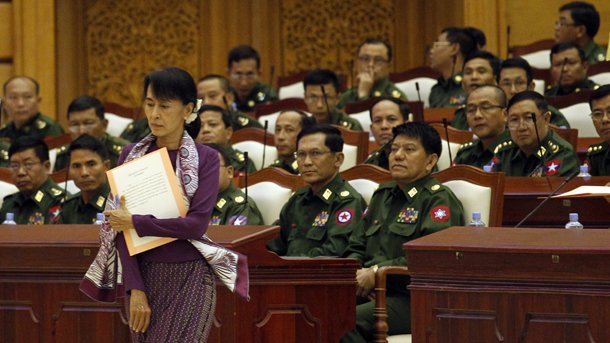RANGOON — Burmese opposition leader Aung San Suu Kyi has invited military lawmakers to dinner in a bid to build ties ahead of a proposed summit on changing the Constitution, which bars her from the presidency, a senior member of her party said on Thursday.
On Tuesday, parliament unanimously endorsed talks among Suu Kyi, President Thein Sein, the speakers of the two houses of parliament, military chief Gen. Min Aung Hlaing, and a member of a party representing an ethnic minority.
On Thursday evening, Suu Kyi hopes to dine in the capital, Naypyidaw, with unelected military MPs who hold a quarter of parliamentary seats, said Nyan Win, a spokesman for her National League for Democracy Party (NLD).
“It will be our first meeting with the military lawmakers,” Nyan Win told Reuters. “We’re not going to talk about any serious matters, but I’m sure it will definitely promote mutual understanding.”
Mutual understanding has long been in short supply in Burma, which emerged in 2011 from 49 years of rule by military generals who unleashed bloody crackdowns on pro-democracy demonstrators and imprisoned political activists.
Suu Kyi has endorsed reforms by the semi-civilian government of former general Thein Sein.
She was famously pictured watching a military parade in Naypyidaw last year, alongside members of the previous junta that had kept her under house arrest for more than 15 years.
But over the past year Suu Kyi, a Nobel Peace laureate, has been critical of the government, accusing it of stalling the reform process.
Her party has gathered about 5 million signatures in support of a petition to amend the military-drafted Constitution to reduce the military’s role in politics.
With just a few hours remaining before Thursday’s event at a hotel in the Burma capital, the military lawmakers had not responded to Suu Kyi’s overture.
No date has been set for the proposed constitutional talks and they can only go ahead if Thein Sein and Min Aung Hlaing agree to take part, said Andrew McLeod, director of the Burma program at the law faculty of Oxford University.
The talks would be “significant,” he said, but warned against putting too much emphasis on them, especially in light of next year’s general election.
Military lawmakers could not immediately be reached for comment.

















